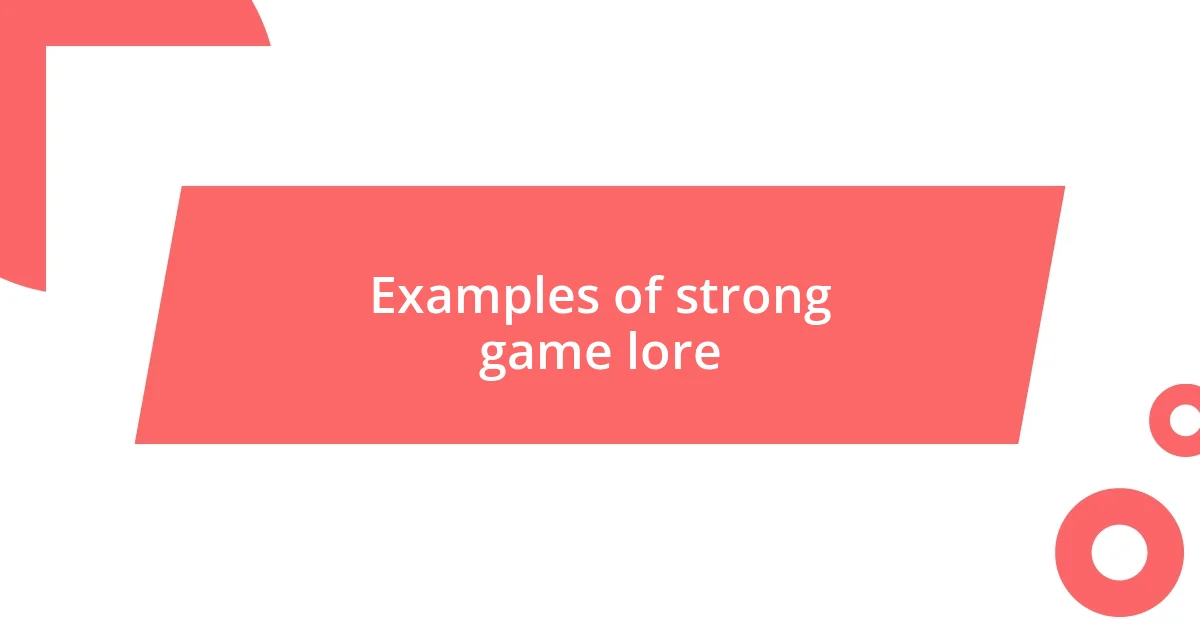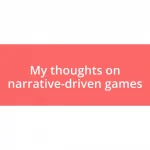Key takeaways:
- Game lore enriches player experience by providing context, emotional connections, and immersive storytelling, making gameplay feel significant.
- Key elements of captivating lore include character depth, world-building, and thematic resonance that encourage personal reflection and emotional engagement.
- The gaming community actively influences lore through discussions, shared theories, and fan-created content, enhancing the overall narrative experience.

What is game lore
Game lore refers to the rich backstory, histories, and narratives that give depth to the world and characters within a game. It’s fascinating how these stories unfold, almost like a living tapestry, weaving together the motivations, cultures, and conflicts of the characters we encounter. Do you remember the first time you discovered a hidden quest that revealed a character’s tragic past? That moment made the game feel so much more real, didn’t it?
When I think of game lore, I often reflect on how it shapes our understanding of the universe the developers created. For instance, in “The Witcher 3,” the lore about the Wild Hunt adds layers of tension and urgency to Geralt’s journey. It was those subtle details, those whispers of history found in books scattered throughout the game, that truly immersed me in its world. Isn’t it amazing how lore can transform a simple gameplay experience into an emotional journey?
Lore provides context, creating an emotional bond between the players and the game. I recall the emotional impact of exploring the ruins in “Dark Souls,” each crumbled archway and faded inscription telling stories of triumph and loss. What if those stories weren’t there? Would the thrill of exploring the unknown still feel so profound? I imagine the answer is a resounding no. Game lore serves as the heartbeat of a game, ensuring that our adventures are not just about what we do, but also about why it matters.

Importance of storytelling
Storytelling is the backbone of any great game, turning mere gameplay into an immersive experience. I remember playing “Skyrim” and being utterly captivated by its questlines; each story arc drew me in deeper, making me care about the fate of the characters involved. It’s like each decision I made was part of a larger narrative that made my character feel significant in a world full of possibilities.
Here are some key reasons why storytelling is vital in gaming:
- Emotional Connection: Well-crafted narratives allow players to form bonds with characters, enhancing the overall experience.
- World-Building: Rich stories create expansive universes that players can lose themselves in, inviting endless exploration.
- Motivation: Engaging plots propel players forward, giving them a reason to conquer challenges and complete quests.
- Investment: When players understand the backstory, they invest in outcomes, celebrating victories and mourning losses alongside the characters.
- Reflection of Reality: Stories often mirror real-life experiences, helping players relate and find meaning in their virtual adventures.

Elements of captivating lore
Elements of captivating lore can vary widely, yet certain aspects consistently draw me into a game’s narrative. One key factor is the complexity of characters. When I encounter a character with a flawed past, like in “Bloodborne,” it evokes empathy. Their struggles make me reflect on my own experiences while guiding me through their journey as if we’re in it together. Isn’t it profound how a character’s backstory can resonate with our personal stories?
Another vital element is the world-building. A well-crafted world feels alive, rich in history and culture. I recall wandering through the vibrant lands of “Zelda: Breath of the Wild,” where every landmark whispered tales of ancient battles and forgotten heroes. It’s as if the environment itself holds memories, making each discovery feel special and meaningful. Do you ever find yourself looking at a landscape in a game and wishing it were real? That’s the power of immersive world-building.
Finally, lore interweaves themes that challenge players’ perspectives. Take “Persona 5,” for instance; its narrative on societal issues sparked deep reflection on my own beliefs. Engaging with themes like change and rebellion made me evaluate my actions in real life, elevating the game beyond mere entertainment. This blend of personal reflection and game lore can lead to unforgettable experiences.
| Element | Description |
|---|---|
| Character Depth | Complex characters with rich backstories create emotional ties. |
| World-Building | Detailed environments filled with history foster exploration and connection. |
| Thematic Resonance | Incorporating relatable themes encourages personal reflection and growth. |

Examples of strong game lore
One striking example of strong game lore is found in “The Witcher 3: Wild Hunt.” I’ll never forget the moment I encountered the character of Geralt of Rivia, who navigates complex moral dilemmas in a world filled with political intrigue and monstrous adversaries. His choices made me pause and reflect: what would I do in a similar situation? Those moral quandaries created an emotional weight that lingered well beyond the game.
Another memorable instance comes from “Dark Souls,” where lore is subtly embedded in item descriptions and environmental storytelling. I felt a sense of achievement piecing together the fragmented stories of fallen kingdoms and tragic heroes. It’s as though the game invites you to be a detective, unraveling its dark and compelling narrative, which kept me hooked. Isn’t it fascinating how a game can challenge you to forge your own understanding of its lore?
Finally, let’s consider “Final Fantasy VII.” The theme of personal sacrifice and the exploration of identity struck a deep chord with me, especially the moment when Aerith’s fate unfolded. It was a gut punch that made me reevaluate my connections in real life. The emotional resonance of that moment is a testament to how strong game lore can leave a lasting imprint on our hearts, isn’t it?

How lore enhances gameplay
When I think about how lore enhances gameplay, the first thing that comes to mind is the way it deepens emotional engagement. I remember playing “Skyrim” and feeling an urgent connection to the main quest because of its rich history. The Dragonborn’s battle against Alduin felt personal, as if I were stepping into an epic tale woven together by choice and consequence. How powerful is it that a game can make us feel like heroes in our own stories?
Moreover, lore serves as a powerful motivator to explore every nook and cranny of a game world. In “Horizon Zero Dawn,” I found myself obsessively scanning for collectibles not just for completion’s sake, but for the lore they contained about the world’s collapse. Each audio log or visual artifact painted a vivid picture of a civilization lost to time, compelling me to dive deeper into the narrative threads that connected past and present. Doesn’t it feel amazing when your curiosity and gameplay intertwine so seamlessly?
Finally, the themes embedded in lore often resonate beyond the screen. In “Life is Strange,” the narrative centers around difficult choices and their ripple effects, reminding me of the weight of decisions in my own life. I still reflect on the impact of those choices while playing; they shaped not just the character’s journey, but also my perceptions about responsibility and relationships. Isn’t it remarkable how game lore can spark profound reflections on our lives?

Community impact on lore
When I think about how the gaming community impacts lore, I can’t help but remember the fervent discussions that erupted around “World of Warcraft.” Players have crafted endless theories about character backstories and hidden Easter eggs, transforming the game’s world into a living, breathing entity. This level of engagement means that we’re not just passive consumers; we become active participants in shaping the narrative.
Community-driven events, like those in “Destiny” where players band together to decipher cryptic messages, have always fascinated me. I recall staying up late with friends, pouring over clues to unveil the story behind the enigmatic Darkness. It’s incredible how a shared goal can create bonds among players, as we collectively navigate through the lore and share our interpretations, making the experience all the more enriching.
Moreover, fan-created content, such as art and fan fiction, often expands upon the official lore in surprising ways. I remember stumbling upon a well-written fan fiction that explored a lesser-known character from “The Legend of Zelda.” It added depth I hadn’t considered, making me appreciate the lore from a different angle. Isn’t it remarkable how a community can elevate and redefine the narratives we cherish within our favorite games?

Creating your own game lore
Creating your own game lore can be an exhilarating process that allows you to weave together characters, settings, and threads of narrative that resonate with players. I still remember the thrill of crafting a backstory for my own game character, layered with motivations and struggles that reflected my own experiences. When those elements clicked into place, it transformed the character from a mere avatar into a figure I genuinely cared about—someone whose journey felt relatable and meaningful.
As I brainstorm ideas, I often reflect on how real-world cultures and histories can serve as expansive inspiration for game lore. For instance, after studying ancient mythologies, I developed a world steeped in legends that echoed the themes of vengeance and redemption. It was fascinating to see how those ancient tales intertwined with my gameplay mechanics—players might harness mythical powers, face moral dilemmas, or seek out the truth behind the legends that shaped their characters’ destinies. Doesn’t it feel exciting to infuse your lore with elements that resonate on a deeper level?
Moreover, collaboration with others can take your lore to a whole new dimension. I recall a time I teamed up with friends, brainstorming rich storylines and creating interconnected narratives that breathed life into our game world. Sharing those ideas back and forth not only made the lore more robust but also created a sense of camaraderie as we built something together. What if you gathered your friends to brainstorm? You might find that co-creating lore not only enriches your game but also strengthens your bonds with fellow gamers.















